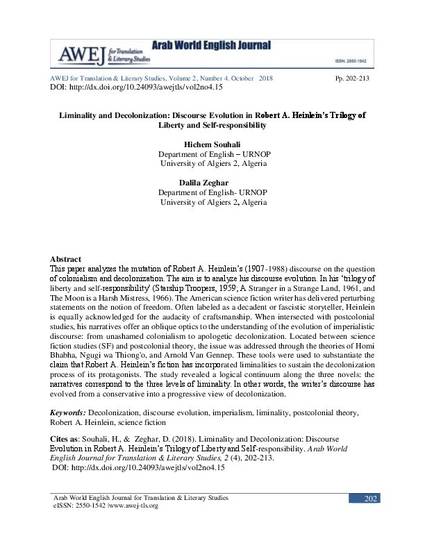
Article
Liminality and Decolonization: Discourse Evolution in Robert A. Heinlein’s Trilogy of Liberty and Self-responsibility
AWEJ for Translation & Literary Studies
(2018)
Abstract
This paper analyzes the mutation of Robert A. Heinlein’s (1907-1988) discourse on the question of colonialism and decolonization. The aim is to analyze his discourse evolution. In his ‘trilogy of liberty and self-responsibility’ (Starship Troopers, 1959; A Stranger in a Strange Land, 1961, and The Moon is a Harsh Mistress, 1966). The American science fiction writer has delivered perturbing statements on the notion of freedom. Often labeled as a decadent or fascistic storyteller, Heinlein is equally acknowledged for the audacity of craftsmanship. When intersected with postcolonial studies, his narratives offer an oblique optics to the understanding of the evolution of imperialistic discourse: from unashamed colonialism to apologetic decolonization. Located between science fiction studies (SF) and postcolonial theory, the issue was addressed through the theories of Homi Bhabha, Ngugi wa Thiong'o, and Arnold Van Gennep. These tools were used to substantiate the claim that Robert A. Heinlein’s fiction has incorporated liminalities to sustain the decolonization process of its protagonists. The study revealed a logical continuum along the three novels: the narratives correspond to the three levels of liminality. In other words, the writer’s discourse has evolved from a conservative into a progressive view of decolonization.
Keywords
- Decolonization,
- discourse evolution,
- imperialism,
- liminality,
- postcolonial theory,
- Robert A. Heinlein,
- science fiction
Disciplines
Publication Date
Fall October 15, 2018
DOI
http://dx.doi.org/10.24093/awejtls/vol2no4.15
Citation Information
Hichem Souhali & Dalila Zeghar. "Liminality and Decolonization: Discourse Evolution in Robert A. Heinlein’s Trilogy of Liberty and Self-responsibility" AWEJ for Translation & Literary Studies Vol. 2 Iss. 4 (2018) p. 202 - 213 ISSN: 2550-1542 Available at: http://works.bepress.com/awejfortranslation-literarystudies/104/